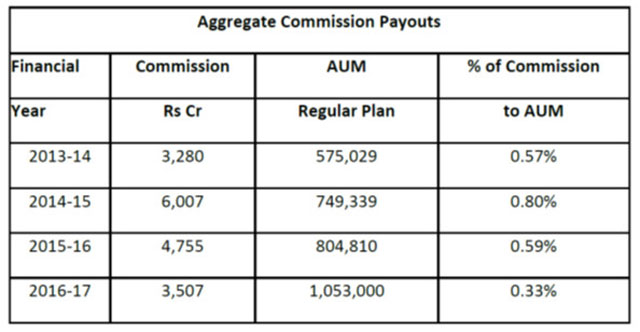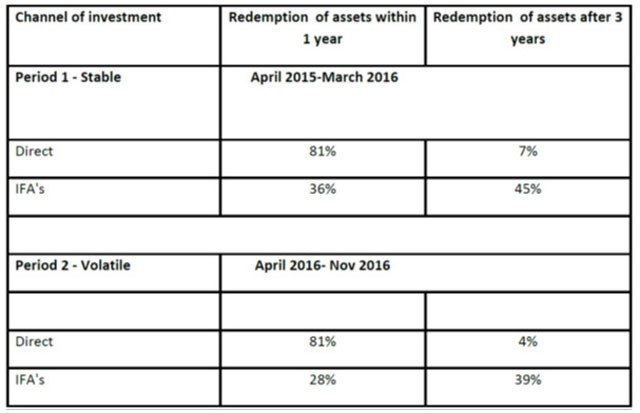This letter follows FIFA's in-person engagement with SEBI on 23rd Dec, when it was invited to SEBI's Mutual Fund Advisory Committee meeting (FIFA was represented by Dhruv Mehta, Yasir Varawala and Lalit Gianchandani) and a subsequent meeting that FIFA was invited to by Mr. Piyoosh Gupta at SEBI.
A watershed moment
In my opinion, this letter marks a watershed moment in regulatory engagement of IFAs in India, as it provides conclusive data and research rather than just alarmist hyperbole to counter some of the misconceptions that seem to be driving regulatory thinking, and forces the regulator to sit up, take note of facts and think hard before making a decision that can have very far reaching consequences. This letter has been widely circulated by FIFA to various stakeholders within and beyond the industry - which is another welcome sign as the best way to put your point across is to (1) present hard data to support your points, and (2) ensure wide publicity of your perspective, to build collective opinion. FIFA has done both of these, and it is really upto every member of this industry who believes strongly in what FIFA is saying in this letter, to take this message to any opinion maker that you may know, and do your bit in building collective opinion around a perspective you believe in.

Global context - think again!
Since SEBI is quite fond of quoting global context as one of the important basis of its thinking, FIFA has reminded Mr. Sinha about the UK's Financial Advice Market Review final report of March 2016, which clearly establishes that UK's switch over from commissions to a fee based model has resulted in an advice gap in the retail segment and driven up total costs for those who can afford advice.
The fact that the report now suggests several remedial measures to address the retail advice gap is a clear acknowledgment of the adverse unintended consequences of believing that a fee based model can be successfully implemented in the retail world - even in a country as mature as the UK.
Commission focus - think again!
Given SEBI's almost single-minded focus on eliminating commissions, in the belief that commissions are the root cause of a lot of evil, FIFA has shared some telling statistics that demonstrate that commissions are reducing sharply - both in absolute terms as well as a %age of AuM on a Y-o-Y basis, consequent to the numerous regulations on commissions in recent years.

The irony of the situation is that this data table was presented by SEBI officials themselves at the recent MF Advisory Committee meeting!
FIFA has also pointed out the flawed thinking in the root cause of the entire "high commission" perception within SEBI, which was the spate of closed ended fund launches in 2014-15. Closed ended funds that year accounted for less than 7% of gross flows! How right is a perception that is based on 7% of flows and which ignores the realities of the balance 93%?
Any objective person looking at both pieces of data in the context of all the regulations that have been recently introduced around commissions, will conclude that these regulations are achieving the intended goal and that the "problem" (if indeed commissions were a problem) is now well contained. One would be tempted for more drastic measures only if data is demonstrating that the problem is growing - not otherwise. Else, it really looks like a case of a pre-meditated decision, with scant regard to facts that prove the contrary. Its like a doctor who insists on an extreme step of chemotherapy even when all reports suggest that the cancer is well on its way out, with the existing set of less aggressive medication and treatment. Why? That's a question that somebody needs to get the Finance Ministry to ask SEBI. Especially when FinMin's own committee (Sumit Bose committee) - as pertinently pointed out in FIFA's letter - clearly states that India is not ready for a switch over from a commission based intermediation model to a fee based one.
We at Wealth Forum have consistently been saying that the RIA regulations are a welcome step in the evolution of financial intermediation in India. Where SEBI is going wrong is its misplaced focus on eliminating commissions as the key thrust of the initiative. What we need is for SEBI to build on the sales process regulations that it introduced in 2012, and encourage distributors to take on higher fiduciary responsibilities that will serve investors well. Let there be more stringent processes while retaining the existing trail based commission structure - that's what will really deliver value to investors and enable market expansion.
Mis-selling vs mis-buying: think again!
There has been a lot of talk in the industry about emphasis on lower costs translating to mis-buying, which could be potentially more damaging than mis-selling. FIFA has reproduced in this context, some very pertinent data shared by Karvy at the recent CII-McKinsey conclave, which clearly establishes that direct investors in equity funds are short term oriented while IFA advised investors stay invested for a much longer time horizon in equity funds.

Exactly why is SEBI still so keen to promote direct? Why does it believe that lower cost = better value? SEBI's open and unabashed support for the direct channel over the distribution channel - thereby exhibiting channel bias - is unbecoming of an impartial regulator. And when there is data that suggests that non-advised investors are showing a clear tendency towards trading rather than investing in equity funds, why does SEBI still continue to believe that investors are better off going direct? Is SEBI's keenness to promote direct really in investors' best interests?
To conclude
I have just highlighted a few salient points made in FIFA's excellent representation. I would urge every industry participant to go through the letter in detail and do what you can in your own cities and towns to ensure that this message reaches out to any opinion maker, influencer, legislator, Parliamentarian who you know, with a request for this to be taken up at the highest levels within the Finance Ministry. All that is being sought is for rational, fact and research based decisions to be made - and not decisions based on perceptions that fly in the face of facts. That's the least that is expected in any democracy.
Share this article
|